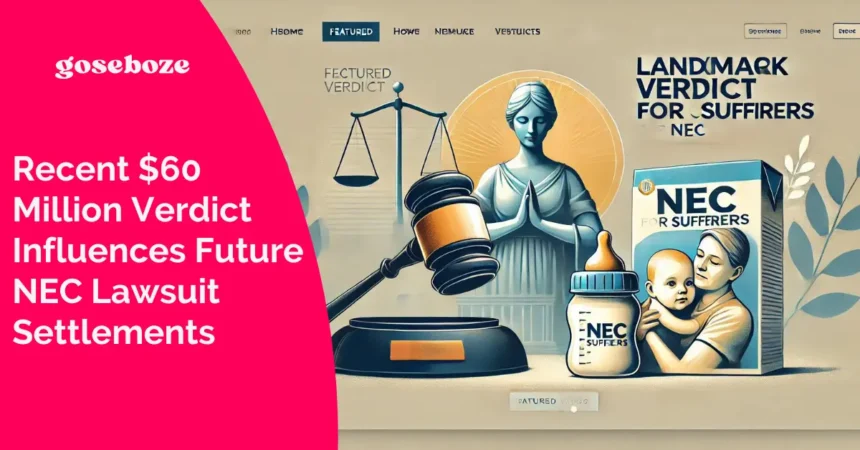For a parent who has seen their baby suffer from NEC (necrotizing enterocolitis), a recent verdict may give them relief. The judgment against Mead Johnson & Company would sure feel like a significant step towards justice. In a landmark decision, an Illinois jury ordered Mead Johnson & Company to pay $60 million in damages. As per a study by Reuters, the payment is for the family of an infant who passed away from baby formula-induced NEC.
This verdict validates the struggles of families and sets a hopeful precedent for the many pending cases still seeking resolution. Let’s explore the implications further in this blog post.
Understanding the NEC Lawsuit and Its Association with Baby Formula
Necrotizing enterocolitis is a serious and potentially fatal condition that affects the intestines of premature infants. An infant’s intestines may become inflamed with NEC, which may result in the death of intestinal tissue. Serious side effects, such as infections and chronic health issues, may result from this. According to Cleveland Clinic, in the worst situations, it may even be lethal.
There is much debate over the relationship between NEC and baby formula, especially formulas made with cow’s milk, like Enfamil. Premature infants fed with these formulas have a 50% increased risk of developing NEC, a finding detailed by the National Center for Biotechnology Information. The risk is much higher as compared to infants relying on breast milk or especially on formulated human milk fortifiers. Even so, a lot of parents did not receive enough information about these dangers.
Read Also: Tax Breaks For Independent Filmmakers And Videographers
There is more at stake in the NEC’s lawsuit against Mead Johnson & Company than money. According to TorHoerman Law, there is also an underlying battle for accountability. The underlying concern is about accusing the company of neglecting to alert parents to the risks associated with their product.
The $60 Million Verdict Forms a Beacon of Hope
An Illinois jury found a unit of British multinational Reckitt Benckiser (Mead Johnson & Company) guilty on March 14, 2024. A recent study posted in MarketWatch affirms that this choice had significant implications for every family impacted by NEC. The jury awarded compensatory and punitive damages after finding the company to be negligent in failing to provide sufficient warnings.
For many other families whose cases are still pending, this verdict is a ray of hope. It establishes a strong precedent that says businesses should be held responsible for the security of their products. It also makes a strong statement about the value of openness and strict safety regulations in the infant formula sector.
Implications for Future Payouts
The verdict has undoubtedly changed the landscape for NEC lawsuit payout for the pending cases.
Here’s why:
Increased Plaintiff Leverage
Families with similar ongoing legal battles are now in a more advantageous position. Their claims have a strong foundation. Thanks to the precedent this case set, the likelihood of receiving favorable results increases.
Possibility of Higher Settlements
Businesses like Abbott Laboratories that are also facing NEC litigation might now be more likely to reach an out-of-court settlement. They may want to minimize the possibility of even larger verdicts. As a result, plaintiffs may receive larger settlement offers.
Regulatory Scrutiny
Regulatory agencies will probably scrutinize the decision more closely. This could result in stricter regulations, such as the FDA finally taking Enafamil and Similac off their exempt infant formula list. This would bolster the impacted families’ claims even more.
For many families who are still waiting for their day in court, it provides hope and a way forward. Money can not make up for the anguish and trauma of witnessing one’s child suffer. Yet, it can give one a sense of justice and hope that future families will be better protected.
FAQs
How does necrotizing enterocolitis occur?
In premature infants, NEC is a dangerous intestinal disease that results in intestinal inflammation and tissue death. Premature infants are at risk as their bodies and organ systems, including the digestive system, are not fully developed. This immaturity can affect the ability of their intestines to withstand the colonization and multiplication of bacteria.
For what reason was Mead Johnson & Company sued?
Mead Johnson & Company was sued for neglecting to provide notice of the risks of NEC in their Enfamil infant formula. According to the lawsuit, the company put profits ahead of the safety of infants. These legal actions have been taken by parents who claim that their infants developed NEC after being fed Enfamil formula.
What part do studies from scientific fields play in these cases?
Important evidence has been found in scientific research associating formulas based on cow’s milk. The solution has a higher risk of NEC in premature infants. These studies back up the plaintiffs’ allegations and aid in proving a company’s legal responsibility.
How can impacted families pursue legal action?
Families who have been harmed by a company’s negligence may take legal action to hold the company responsible and obtain damages for losses. Speak with specialized lawyers for advice and support throughout the legal process.
This verdict is not just a win for the immediate victim’s family. It’s a victory for all families fighting for safer products and greater transparency in the infant nutrition industry. The prevailing scenario highlights the importance of rigorous safety standards. There is also a need for companies to prioritize the well-being of the most vulnerable members of our society.

Morgan Reid, with an MBA and a decade in business strategy, specializes in boosting company performance and operational efficiency. Known for practical insights, Morgan contributes to publications and speaks at industry events, blending expertise with a passion for tech and business innovation.







